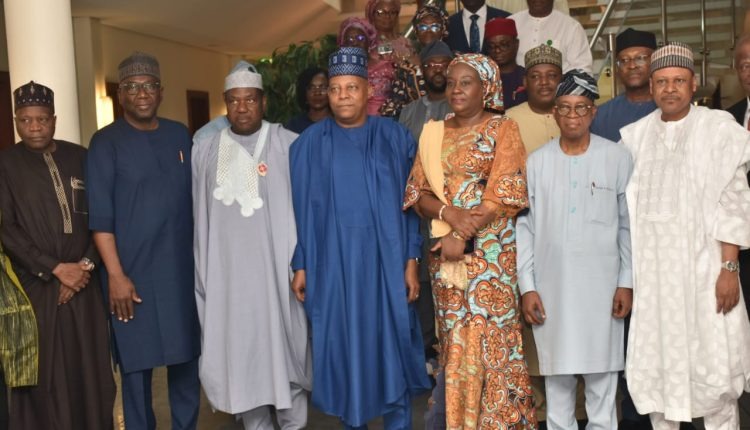Vice President Kashim Shettima on Thursday inaugurated the 3rd Cohort of the Presidential Enabling Business Environment Council (PEBEC), calling its members to be 100% committed to promoting a conducive business environment.
This, according to him, would directly reflect the strong political will behind the transformative initiatives of President Bola Ahmed Tinubu-led government.
Speaking during the inaugural meeting of the PEBEC at the Presidential Villa, Abuja, Sen. Shettima also implored members of the Council to align themselves effortlessly with the 8-point Renewed Hope agenda of the Tinubu administration.
He said, “Aligning seamlessly with the vision of His Excellency, President Bola Ahmed Tinubu GCFR, and the 8-point Renewed Hope agenda of this administration, our commitment to fostering a conducive business environment is a direct reflection of the strong political will driving the transformative initiatives of this government.
“Today, we stand on a robust foundation, and we recognize that achieving PEBEC’s mandate directly contributes to the success of our shared economic prosperity as a nation.
“Undoubtedly, reforms are formidable undertakings, particularly in our region. However, history has proven that they are achievable, and we draw inspiration from past successes. As a council, our dedication to these reforms must be unwavering, and each member must take ownership of this mission with 100% commitment.
“The PEBEC is an enabler for the MDAs in government. Our role, therefore, calls for a unified and collaborative effort across the council and MDAs. Reforms require a collective commitment, and success will be a shared triumph, resonating not only within our council but throughout the nation,” the Vice President stated.
Recalling that emerging markets, particularly in Africa, were slowed down in the face of global economic challenges occasioned by the disruptions of the COVID-19 pandemic, VP Shettima regretted that “heightened geopolitical tensions in the West African Sahel, coupled with concerns about national debt sustainability, contributed to a slowdown in Sub-Saharan Africa’s economic growth to 3.6% in 2022.
“Nigeria, as the largest economy in Africa, experienced a significant economic slowdown over the past decade. For instance, by the end of the last decade, Africa’s GDP was $400 billion less than what experts predicted it to be. Nigeria alone accounted for $140 billion (or 37%) of this unrealized GDP gain,” he added.
The Vice President however expressed optimism that Nigeria has remained steadfast in navigating the challenges through its commitment to economic revival and growth at both the national and continental levels, with 2023 businesses generating over $1 billion in revenue.
“Furthermore, amidst the economic challenges, it is with great pride and optimism that we acknowledge the remarkable resilience of the Nigerian business landscape. Currently, our nation boasts 23 businesses generating over $1 billion in revenue—a testament to the entrepreneurial spirit and economic prowess within our borders,” he noted.
In celebrating the achievements of these 23 businesses, VP Shettima underscored the need to consider them as the beginning of Nigeria’s potential, just as he maintained that all hands must be on deck “to foster the growth of more businesses of such caliber.
“Creating an environment conducive to the emergence and sustenance of high-value enterprises is the true litmus test of the collective endeavors we put into reforming and expanding our economy.
“Our commitment should extend beyond overcoming challenges; it should drive us to cultivate an ecosystem where innovation, investment, and entrepreneurship thrive, propelling Nigeria into a new era of sustainable economic prosperity,” he told members of the Council.
He further urged members of the council to be diligent, noting that teamwork and shared commitment are the right attitudes required to actualise the transformative impact that PEBEC could bring to Nigeria’s business environment for the overall success of the Tinubu administration.
Inaugurating the Council, the VP said, “Today, as we confront these difficulties head-on, our goal is not merely to weather the storm but to create more winners — enterprises that not only withstand challenges but thrive and contribute substantially to our economic vitality.
“I hereby inaugurate the 3rd Presidential Enabling Business Environment Council.”
Earlier, the Special Adviser to the President on PEBEC and Investment, Dr Jumoke Oduwole, noted that PEBEC’s mandate is to deliver Nigeria’s business environment reform, with the dual mandate to remove bureaucratic and legislative constraints to doing business and improve the perception about the ease of doing business in Nigeria.
“PEBEC’s model aligns with global best practices and includes a strong performance tracking element that ensures MDAs are accountable for reform implementation,” she said.
Dr Oduwole said that one of the key considerations for PEBEC Cohort under the chairmanship of Vice President Kashim Shettima is the political will from President Bola Ahmed Tinubu’s administration and his irrevocable commitment to Ease of Doing Business in line with the 8-point agenda of the administration and added that the Vice President has decided to adopt the PEBEC model and build on the past work.









